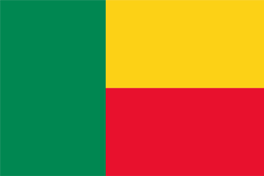 |
République du BéninIndependence 1 August 1960
History Today's Benin should not be confused with the Benin of ancient African history located in present-day Nigeria and made famous by its sumptuous bronze sculpture. Called 'Dahomey' by French colonizers, modern Benin is one of the African countries where pre-colonial states existed. The most famous is the Kingdom of Abomey, founded in the 17th century, also called Dahomey (Dan-ho-mè, 'on the stomach of Dan', from King Dan, from whom the states are absorbed to form a new kingdom). In the 19th century, a small coastal territory breaks away to form the Kingdom of Porto Novo. Few African states are as demonized as Dahomey, portrayed as a 'slave state' and stigmatized for its human sacrifice rituals. In reality, it is to escape looting by neighbours that these peoples unite under the new state, which to defend itself buys arms from Europeans and, against its will, enters the slave trade. After the slave trade is abolished and in spite of the presence of a few Brazilian slave traders, including the famous Chacha (Francisco de Souza), King Glèlè (1818-1858) commits his kingdom to the production of palm oil in order to profit from strong European demand. The new wealth arouses French ambition to conquer the kingdom. Two wars ensue (1890 and 1892-1894), during which an elite army of female warriors fight heroically. The symbol of the resistance, King Behanzin (1884- 1894, died 1906), is exiled to Martinique, then to Algeria. Integrated into French West Africa (AOF), the colony of Dahomey becomes a breeding ground for pan-Africanism, embodied by Marc Kodjo Tovalou Houénou in the first third of the 20th century, and by Derlin Zinsou after 1945. Called 'Africa's Latin quarter' by the philosopher Emmanuel Mounier, Dahomey perhaps suffers from its many intellectuals, who engage in fierce political competition that will render the country one of independent Africa's most unstable. At first taken by the idea of the 'Mali Federation', which is supposed to unite nearly all of the AOF into a single state, Dahomey opts, on the eve of independence, for the 'Council of Accord' conceived by the Ivorian Félix Houphouët-Boigny. In 1975, Colonel Mathieu Kérékou, in power thanks to a coup d'état, renames the country 'Benin', in reference to the glorious past of 'precolonial' Africa. Elikia M'Bokolo (EHESS/UNIKIN) |


